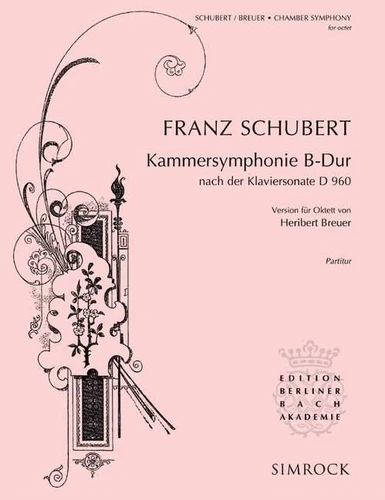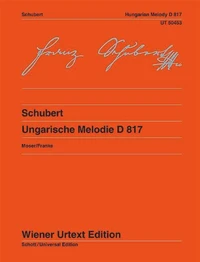Edition Berliner Bach Akademie
Symphonie de chambre en si bémol majeur. (d'après la Sonate pour piano D 960). clarinet, bassoon, horn, 2 violins, viola, cello and double bass. Partition et parties.
Par : Formats :
- Paiement en ligne :
- Livraison à domicile ou en point Mondial Relay indisponible
- Retrait Click and Collect en magasin gratuit
- Nombre de pages212
- Poids0.676 kg
- Dimensions23,1 cm × 30,3 cm × 0,0 cm
- ISBN979-0-2211-2119-6
- EAN9790221121196
- Date de parution01/01/2007
- CollectionCLARINETTE
- ÉditeurBOOSEY
- EditeurHeribert Breuer
Résumé
Schubert's last piano sonata in a chamber symphony version for classical octet : aware that no really adequate works of the same instrumentation exist which might complement a concert programme with Schubert's singular Octet op. 166, Heribert Breuer has chosen the major Piano Sonata in Bb major, published posthumously, for a new version in this instrumentation. Breuer calls his version a 'chamber symphony' to express the basic symphonic idea of this extraordinary work in the title.
It will not escape the expert's notice that by instrumentation and articulation, a bridge is built in the slow movement to the adagio of the string quintet also created in 1828, the year of Schubert's death : 'Fülle des Wohllauts'. Instrumentation : clarinet, bassoon, horn, 2 violins, viola, cello and double bass
It will not escape the expert's notice that by instrumentation and articulation, a bridge is built in the slow movement to the adagio of the string quintet also created in 1828, the year of Schubert's death : 'Fülle des Wohllauts'. Instrumentation : clarinet, bassoon, horn, 2 violins, viola, cello and double bass
Schubert's last piano sonata in a chamber symphony version for classical octet : aware that no really adequate works of the same instrumentation exist which might complement a concert programme with Schubert's singular Octet op. 166, Heribert Breuer has chosen the major Piano Sonata in Bb major, published posthumously, for a new version in this instrumentation. Breuer calls his version a 'chamber symphony' to express the basic symphonic idea of this extraordinary work in the title.
It will not escape the expert's notice that by instrumentation and articulation, a bridge is built in the slow movement to the adagio of the string quintet also created in 1828, the year of Schubert's death : 'Fülle des Wohllauts'. Instrumentation : clarinet, bassoon, horn, 2 violins, viola, cello and double bass
It will not escape the expert's notice that by instrumentation and articulation, a bridge is built in the slow movement to the adagio of the string quintet also created in 1828, the year of Schubert's death : 'Fülle des Wohllauts'. Instrumentation : clarinet, bassoon, horn, 2 violins, viola, cello and double bass












